
[ad_1]
Like a prize fight weigh-in, the AMD Ryzen 7 4800U in Lenovo’s IdeaPad Slim 7 just flexed like no other ultrabook CPU we’ve ever seen.
It’s almost as though the Ryzen 7 4800U snatched the mic from the podium and started hurling insults at Intel’s upcoming Tiger Lake CPU. If there was a folding chair, we’re sure it would been thrown at Intel’s entourage while the flash bulbs popped.
While we’re still in the process of finishing our testing, the early results we’re seeing are gobsmackingly impressive. How impressive? When we started hunting in our spreadsheet for how other laptops performed against the IdeaPad Slim 7’s results, we kept scrolling, and scrolling, and scrolling to find something comparable. At that point, any hardware reviewer worth his or her salt questions whether they’re “doing it wrong.” Did I run the wrong test? Am I in the wrong row? Do I need more coffee?
No. Not at all. The Ryzen 7 4800U in the IdeaPad Slim 7 is just that stupidly fast.
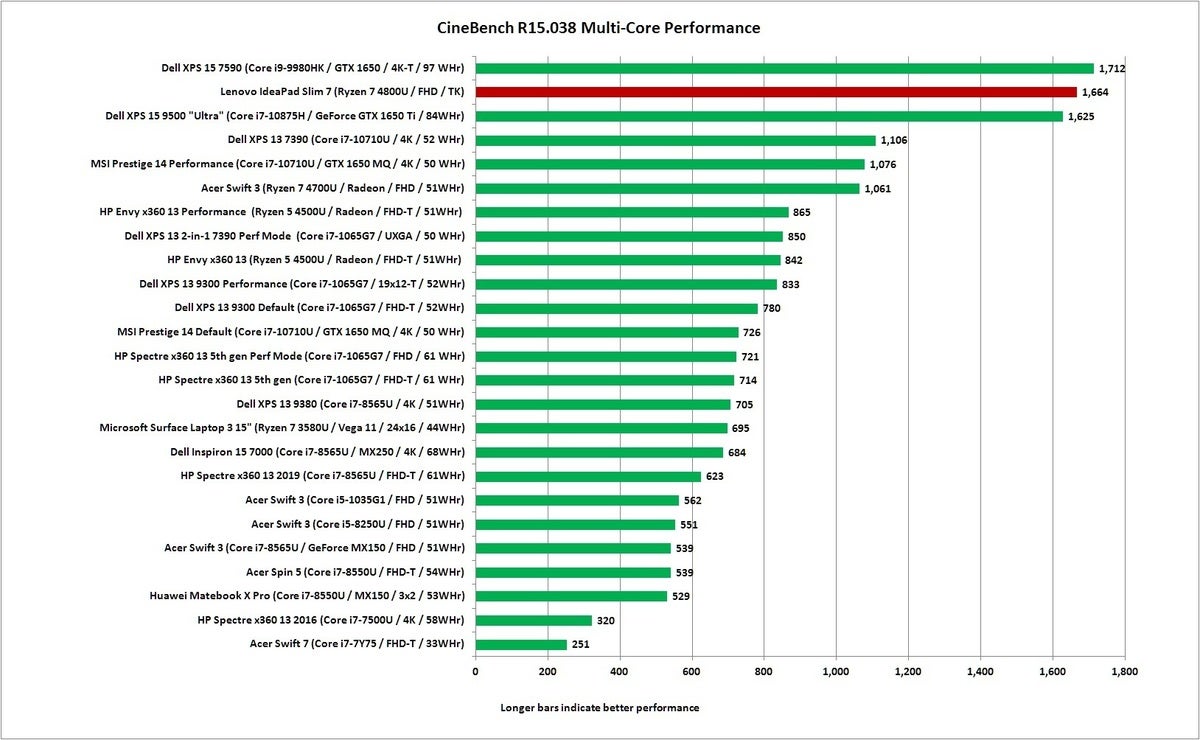 IDG
IDGWe thought we ran the wrong test, but nope. The Ryzen 7 4800U in the Lenovo IdeaPad Slim 7 is that fast.
Peep the scores from Maxon’s older Cinebench R15 benchmark, which uses all cores to measure a CPU’s performance at rendering a 3D image. We’re not kidding either. We initially thought we ran the wrong test or simply recorded it wrong, but the IdeaPad Slim 7 and the Ryzen 7 4800U is just that fast in this short, all-core performance test.
As you look at this chart, you should note the two laptops that are even remotely close to the IdeaPad’s performance aren’t even the same class of notebook. Both the Dell XPS 15 7590 with an 8-core Core i9-9980HK and the new Dell XPS 15 9500 with an 8-core Core i7-107850H CPU are basically 4.5-plus lbs. content creation laptops with discrete GPUs and beefy cooling.
Intel’s 6-core Comet Lake are next up, but the 4-core laptops aren’t even eating dust compared to the IdeaPad Slim 7, because the shock wave from the Ryzen 7 4800U has sucked the dust with it.
Even more interesting is the performance of the Ryzen 7 4700U in the budget-priced Acer Swift 7. It’s also an 8-core CPU, but AMD leaves simultaneous multi-threading (a.k.a. it’s version of Hyper-Threading) off. SMT is enabled on the IdeaPad Slim 7 and we’re looking at a huge performance bump.
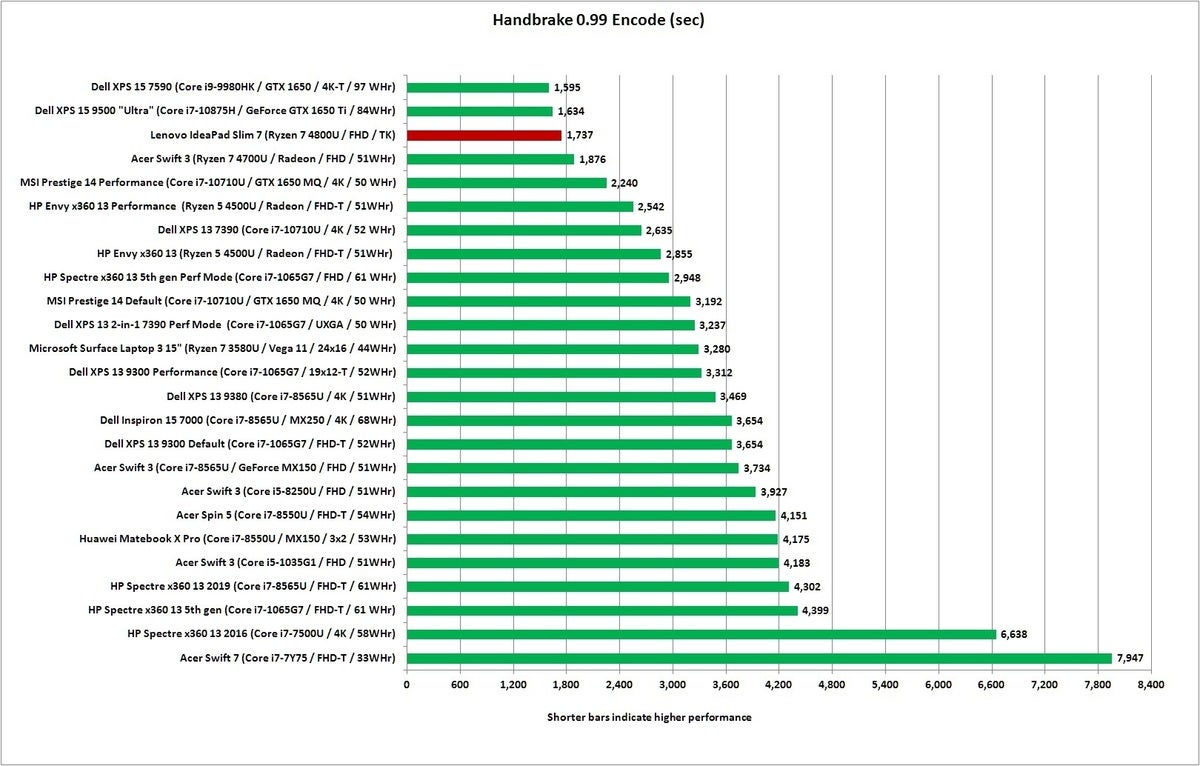 IDG
IDGOn a longer workload, the thermals come back into play and the Slim 7 comes back to earth. It’s still enough to basically make us what just what Intel’s H-class laptops are doing with all that power they have though.
One issue with Cinebench R15 is its short runtime—maybe a minute, if that. Modern laptops are all limited by thermals and a short test doesn’t really tell you how well a laptop can handle a really long task. For that, we run Handbrake and encode a 30GB 1080P file using the Android Tablet preset. On an ultrabook, it used to over an hour to run, and was really just a test to see how well laptops handled heat over a long test. With today’s notebooks though, actually running a CPU encoding task on a 3 lbs. laptop is entirely realistic.
The result is still pretty amazing, but we do see that the Lenovo IdeaPad Slim 7 doesn’t leave its Ryzen siblings in the dust. It still eats the lunch (and dinner) of the Intel 10th-gen Comet Lake U and 10th-gen Ice Lake U laptop, but the thermal limitations of a thin and light laptop are at play. And yes, it’s really not that much slower than an 8-core Core i7-10875H in the Dell XPS 15 9500 either. Phew.
Besides CPU performance, AMD’s graphics matter too. With the Ryzen 7 4800U, you get one more graphics core over the Ryzen 7 4700U, and you get slightly higher clock speeds: 1,750MHz vs. 1,600MHz. The Lenovo IdeaPad Slim 7, however, also sports LPDDR4X RAM clocking as high as 4,267MHz. Most of the Ryzen laptops we’ve seen feature dual-channel DDR4/3200 memory that’s slower, but lower cost.
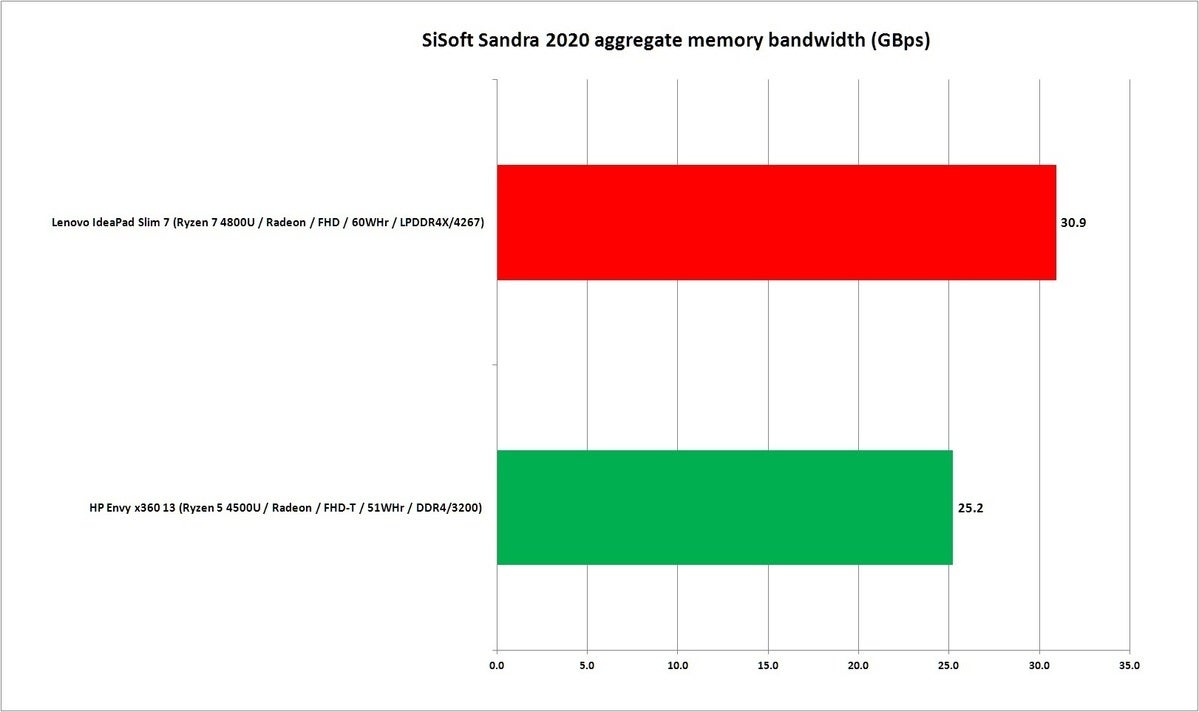 IDG
IDGDual-channel LPDDR4X/4267 offers about 23 percent more bandwidth over a dual-channel DDR4/3200 configuration.
Graphics performance can typically use all the memory bandwidth it can get so we suspect the IdeaPad Slim 7 gets a boost from both the additional graphics core and the clocks plus the faster LPDDR4X/4267 RAM.
To see how much more memory bandwidth you’d get, we compared the HP Envy x360 13 with its Ryzen 5 and DDR4/3200 to the Lenovo IdeaPad SlimPad 7 and its LPDDR4X/4267. Don’t take this as a repudiation of the HP because we’re really focusing on the main memory subsystem here, and we suspect most other DDR4 laptops would perform the same. When we get a chance, we’ll also look at the memory bandwidth of LPDDR4X/3733 common in Intel Ice Lake laptops use. Just to note: Intel’s Tiger Lake will support LPDDR5X at even higher clock speeds.
Ryzen desktop CPUs typically benefit from increased memory clocks, but we expect the integrated Radeon graphics in mobile Ryzen to see an even more substantial boost. Let’s look at how to the Ryzen 7 4800U does with its faster LPDD4X RAM. We’ll use the synthetic 3DMark Sky Diver as a way to gauge performance.
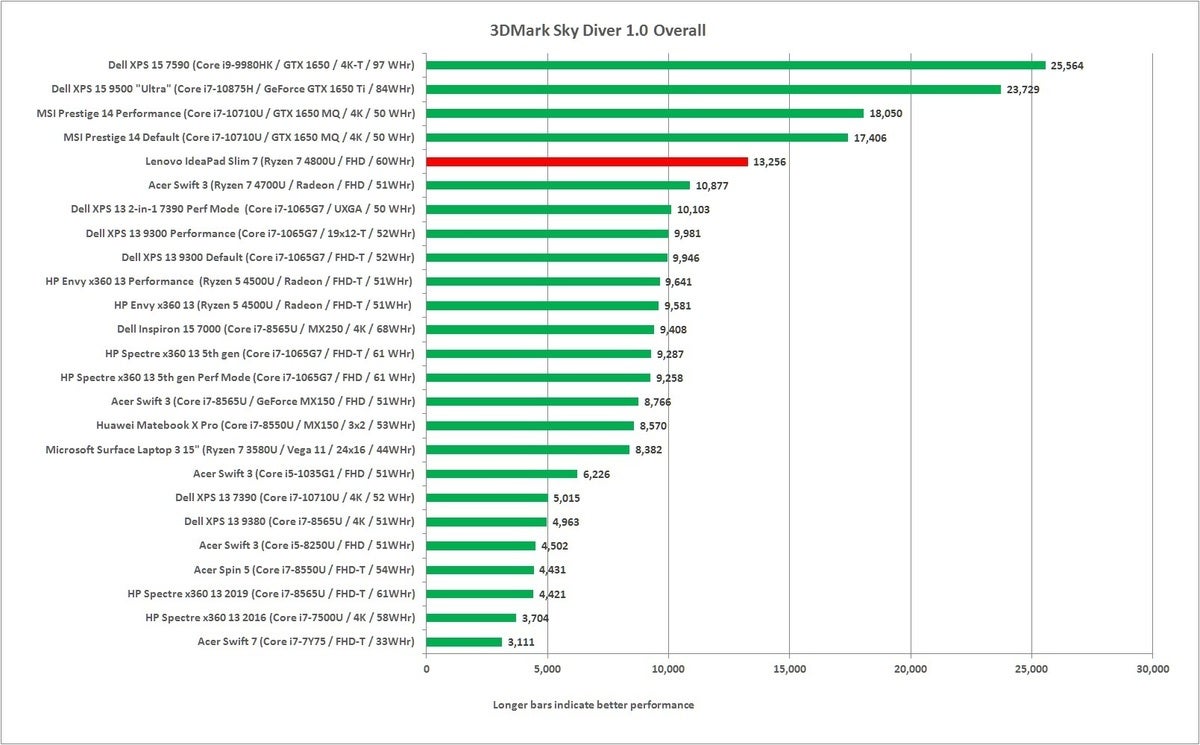 IDG
IDGThe additional CU, higher clocks and faster main memory gives the Ryzen 7 4800U in the IdeaPad Slim 7 a very healthy increase in graphics performance.
The result is a very healthy bump in performance over the seven Radeon cores in the Ryzen 7 4700U, but some of that is the increased number of graphics cores, the increased clock speeds, and also the increase in CPU thread count, as the score above is the overall result. Delving into just the graphics score for 3DMark Sky Diver, it gets a little closer. Lenovo’s IdeaPad Slim 7 and its Ryzen 7 4800U gave us a score of 13,083; the Ryzen 5 4500U in the HP Envy x360 13 got 9,547; and the Acer Swift 3 and its Ryzen 7 4700U finished with 10,888.
And no: There is no Thunderbolt 3
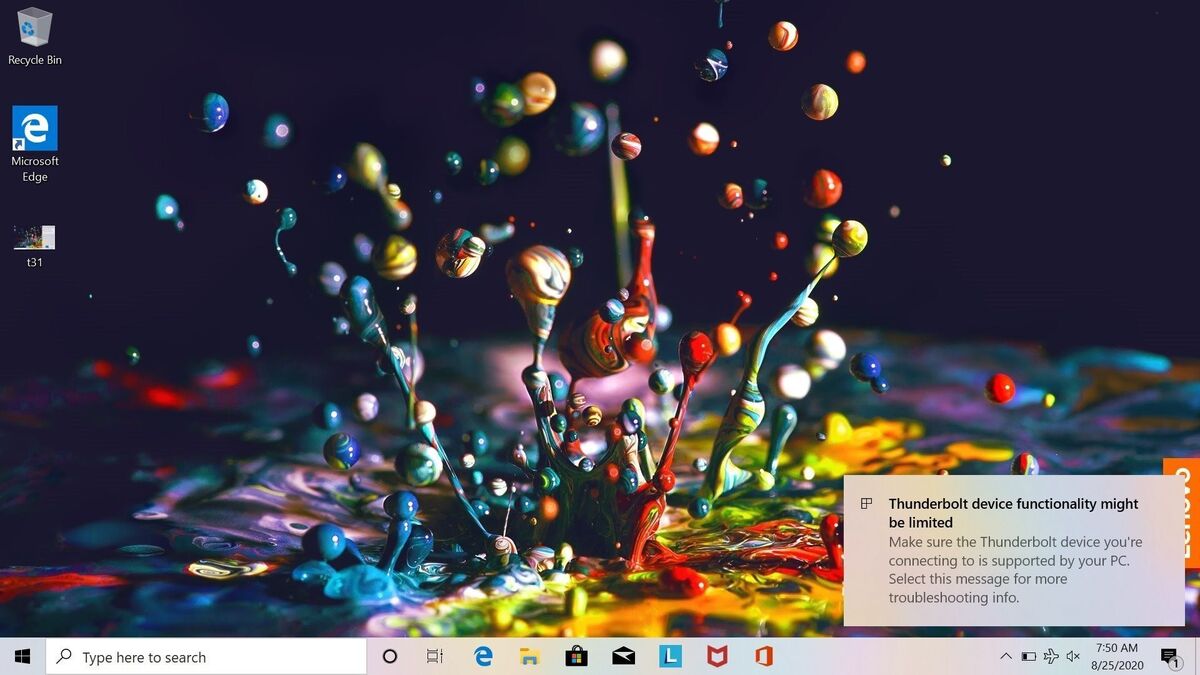 Gordon Mah Ung/IDG
Gordon Mah Ung/IDGThe notification in the bottom-right corner of this screenshot appears when you plug a Thunderbolt device into the Lenovo IdeaPad Slim 7.
Despite some early reports that the IdeaPad Slim 7 has the Holy Grail of features in an AMD laptop—Thunderbolt 3—it doesn’t. After reading those reports, we got giddy with our Thunderbolt 3 accessories, only to end up with the same Charlie Brown football we’ve seen on Ryzen 4000 laptops for the last five months.
What this means
So what does this all matter? Well, the main take away is that the Ryzen 7 4800U has finally arrived just in time for the main fight.
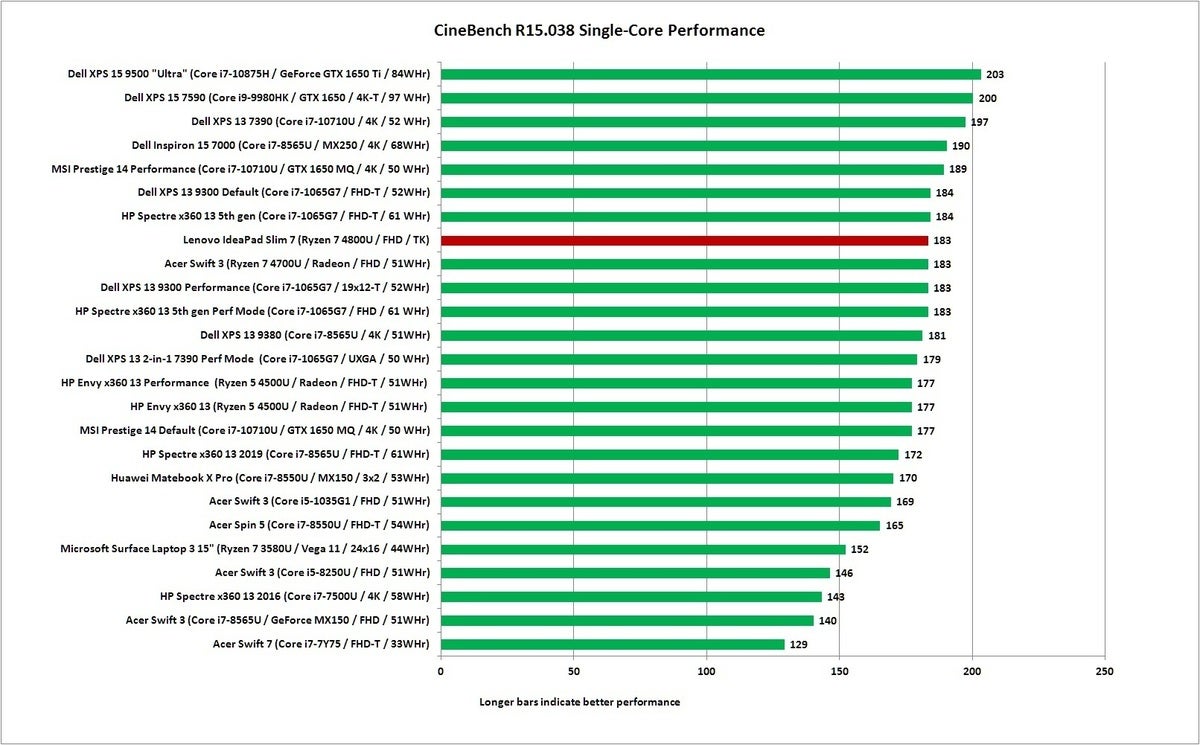 IDG
IDGTiger Lake is likely to clean Ryzen 4000’s clock in single-threaded performance and that might just matter more.
When Intel unwraps its 11th-gen “Tiger Lake” CPUs next week, we’ll witness an epic battle for the soul of thin and light laptops unlike any we have ever seen before. Our earlier prediction that Tiger Lake will lose against Ryzen 4000 in multi-threaded tasks stays the same. Well, kind of. After seeing the Ryzen 7 4800U’s results, we actually think it’ll be a total blowout in multi-threaded performance now. Graphics, however, might just be closer than we expected. And one area Tiger Lake is likely to win big is single-threaded performance, which is actually probably more important for most of what it is done in a small laptop.
Stay tuned for our full review of the Lenovo IdeaPad Slim 7, and for more information about Intel’s imminent Tiger Lake counterpunch.
[ad_2]
Source link